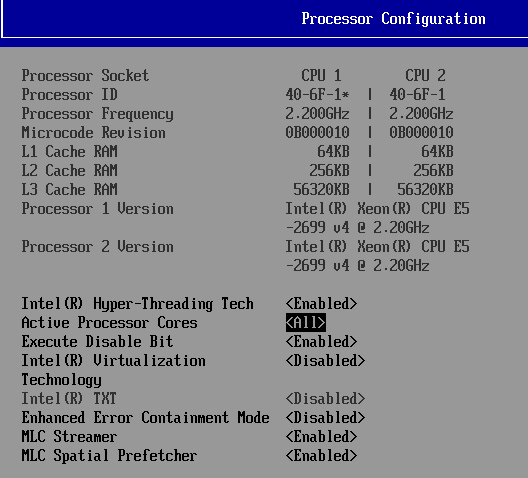The Intel Xeon E5 v4 Review: Testing Broadwell-EP With Demanding Server Workloads
by Johan De Gelas on March 31, 2016 12:30 PM EST- Posted in
- CPUs
- Intel
- Xeon
- Enterprise
- Enterprise CPUs
- Broadwell
Benchmark Configuration and Methodology
All of our testing was conducted on Ubuntu Server 14.04 LTS. Admittedly, that might seem like an old distribution to some of our readers, but enterprises prefer stability and support over the latest software. We did upgrade this distribution to the latest release (14.04.4), which gives us more extensive hardware support.
To make things more interesting, we tested 4 different SKUs and included the previous generation Xeon E5 v3s, the Xeon E5-2697v2 (high end Ivy Bridge EP), and the E5-2690 (high end Sandy Bridge EP). We even included the Xeon X5680 for comparison reasons. The Xeon E5-2695 v4 is interesting to compare to the Xeon E5-2699 v3 as it has the same core count and more or less the same clockspeed. That way we could quantify the improvement that the Broadwell core offers over the Haswell core.
Last but not least, we want to note how the performance graphs have been color-coded. Orange is the latest generation (v4), dark blue the previous one (v3), and light blue is the generation that the current (v4) is (arguably) supposed to replace (Xeon E5 v1).
Intel's Xeon E5 Server – S2600WT (2U Chassis)
| CPU | Two Intel Xeon processor E5-2699v4 (2.2 GHz, 22c, 55MB L3, 145W) Two Intel Xeon processor E5-2695v4 (2.1 GHz, 18c, 45MB L3, 145W) Two Intel Xeon processor E5-2699v3 (2.3 GHz, 18c, 45MB L3, 145W) Two Intel Xeon processor E5-2695v3 (2.3 GHz, 14c, 35MB L3, 120W) Two Intel Xeon processor E5-2667v3 (3.2 GHz, 8c, 20MB L3, 135W) |
| RAM | 128GB (8x16GB) Kingston DDR-2400 |
| Internal Disks | 2x Intel SSD3500 400GB |
| Motherboard | Intel Server Board Wildcat Pass |
| Chipset | Intel Wellsburg B0 |
| BIOS version | 1/28/2016 |
| PSU | Delta Electronics 750W DPS-750XB A (80+ Platinum) |
The typical BIOS settings can be seen below.
SuperMicro 6027R-73DARF (2U Chassis)
| CPU | Two Intel Xeon processor E5-2697 v2 (2.7GHz, 12c, 30MB L3, 130W) Two Intel Xeon processor E5-2690 (2.9GHz, 8c, 20MB L3, 135W) |
| RAM | 128GB (8x16GB) Samsung at 1866 MHz |
| Internal Disks | 2x Intel SSD3500 400GB |
| Motherboard | SuperMicro X9DRD-7LN4F |
| Chipset | Intel C602J |
| BIOS version | R 3.0a (December the 6th, 2013) |
| PSU | Supermicro 740W PWS-741P-1R (80+ Platinum) |
All C-states are enabled in both the BIOS.
Other Notes
Both servers are fed by a standard European 230V (16 Amps max.) power line. The room temperature is monitored and kept at 23°C by our Airwell CRACs.











112 Comments
View All Comments
ltcommanderdata - Friday, April 1, 2016 - link
Does anyone know the Windows support situation for Broadwell-EP for workstation use? Microsoft said Broadwell is the last fully supported processor for Windows 7/8.1 with Skylake getting transitional support and Kaby Lake will not be supported. So how does Broadwell-EP fit in? Is it lumped in with Broadwell and is fully supported or will it be treated like Skylake with temporary support until 2018 and only critical security updates after that? And following on will Skylake-EP see any Windows 7/8.1 support at all or will it not be supported since it'll presumably be released after Kaby Lake?extide - Friday, April 1, 2016 - link
When MS says they are not supporting Skylake on Windows 7 DOES NOT MEAN it won't work. It just means they are not going to add any specific support for that processor in the older OS's. They are not adding in the speed shift support, essentially.For some reason the press has not made this very clear, and many people are freaking out thinking that there will be a hard break here will stuff will straight up not work. That is not the case.
Broadwell has no new OS level features over Haswell (unlike Skylake with speed shift) so there is nothing special about Broadwell to the OS. As the poster above mentions, they are all x86 cpu's and will all still work with x86 OS's.
The difference here is between "Fully Supported" and Compatible. Skylake and even Kaby Lake will be compatible with WIndows 7/8/8.1.
aryonoco - Friday, April 1, 2016 - link
Johan, this is yet again by far the best Enterprise CPU benchmark that's available anywhere on the net.Thank you for your detailed, scientific and well documented work. Works like this are not easy, I can only imagine how many man hours (weeks?) compiling this article must have taken. I just want you to know that it's hugely appreciated.
JohanAnandtech - Friday, April 1, 2016 - link
Great to read this after weeks of hard work! :-Dfsdjmellisse - Friday, April 1, 2016 - link
hello, i want to buy E5-2630L v4any one can give me website for buy it ?
Best regards
HrD - Friday, April 1, 2016 - link
I'm confused by the following:"The following compiler switches were used on icc:
-fast -openmp -parallel
The results are expressed in GB per second. The following compiler switches were used on icc:
-O3 –fopenmp –static"
Shouldn't one of these refer to icc and the other to gcc?
JohanAnandtech - Friday, April 1, 2016 - link
Pretty sure I did not mix them up. "-fast" does not work on gcc neither does -fopenmp work on icc.patrickjp93 - Friday, April 1, 2016 - link
Um, wrong and wrong. -Ofast works with GCC 4.9 and later for sure. And -fopenmp is a valid ICC flag post-ICC 13.JohanAnandtech - Saturday, April 2, 2016 - link
"-fast" is a typical icc flag. (I did not write -"Ofast" that works on gcc 4.8 too)extide - Friday, April 1, 2016 - link
Johan, if you read the comment, you can see that you mention icc for BOTH.